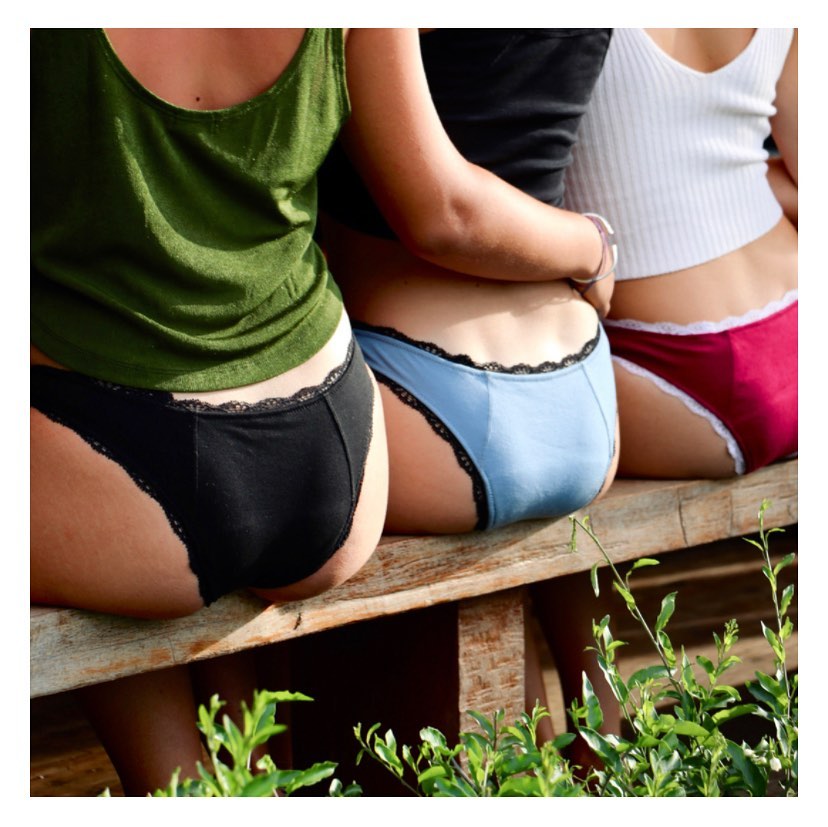Daphné Morize is a 20 year old Bachelor in Management student at ESCP Business School. She grew up in Madagascar before moving to Paris, where she began her business studies.The idea for Mena began while she was in Madagascar but as she began her studies at ESCP she was able to shape it into a proper startup. Mena is a menstrual underwear that looks exactly like normal underwear but is made out of hemp, which has been dubbed “nature’s purifier”. Hemp has a very low water consumption and absorbs more carbon dioxide per hectare than other crops and most trees. Hemp is one of the strongest and most durable of all natural textile fibers and because Mena Lingerie panties are created from this material they can last for five to seven years. The panties have the same look and feel as regular ones. They are colorful and lacey. The Mena Lingerie panty collection was designed by Daphné herself with help from a designer based in London. In Madagascar, menstruation is a really taboo subject and Daphné wanted to change this mindset. Through Mena Lingerie she hopes to drive social awareness and remove the stigma faced by women when they discuss this topic while at the same time being environmentally sustainable.

The ideation process and the role of ESCP
Daphné has four sisters in her family and during her high school years they used to discuss how no one was happy with their period and hygiene products. She was very young but the idea stayed with her because, in her own words, “there’s a problem when half of the population is unhappy”. When she moved to Paris in 2020 and started studying at ESCP, she decided to actively pursue her dream project. At ESCP, Daphné was surrounded by entrepreneurs and attended conferences, spoke to others about projects and gained insights from her professors. This was a pivotal moment as mentioned by Daphné during her interview with Supriyo (from the Blue Factory team). She crafted her first business plan and sent it to her parents who were impressed and helped her get the project off the ground. Daphné credits the START program of ESCP Blue Factory for helping her to get the project on the right trajectory. Even though it was during the time that the pandemic was in full swing, Blue Factory helped her connect with entrepreneurs and provided valuable business insights. As she started on the challenging path of building her startup, she met like-minded people along the way that showed her that she was not alone on her journey. ESCP was always a beacon in the darkness and during the days she was tired or disappointed with the journey she could make use of the support system at Blue Factory to keep marching on. Daphné conducted a survey of 300 women to understand what women were looking for and she used the feedback to fine tune Mena Lingerie’s products.

The challenging task of tackling menstrual hygiene
Mena Lingerie panties are produced at a factory in Madagascar that is headed by an old, veteran businessman. Daphné had the daunting task of convincing him for production support and it was not easy. When she pitched the idea for the first time, he told her “Do you really think that you’re going to revolutionize the world of menstrual products with a bitchy thong?”. Due to her young age, no past experience and the sensitive subject matter it was very hard for her to start the production process. People in Madagascar are averse to discussing menstruation and she had to overcome that aspect as well in her efforts to try out her idea. She persisted and despite a lot of pushback kept on pitching her idea until the factory owner allowed her to start the process on a trial basis. Today, after having sold some of her inventory and having generated a lot of interest for her unique products, the factory owner is much more supportive. Daphné had to prove herself by executing the ideas she had and at 18 years of age this was a very intimidating task. But her entrepreneurial spirit shone through and she was able to finally show everyone that her idea was worth pursuing.

Mena Lingerie’s journey so far
Every entrepreneurial project requires resources like time and money for its inception. For Mena Lingerie, due to the tangible nature of its products, Daphné needed some starting capital. Luckily, her parents covered the startup expenses even though she was ready to head to the bank with her business plan. However, she only got money once every 3 months and her budgeting needed to be immaculate to survive each trimester on the fixed amount of money she received. Her family was supportive but many others asked her complicated financial questions and told her that she would not succeed. She was young and it was hard for her to deal with the naysayers but she really enjoyed the entrepreneurial journey. Still, it was not all smooth sailing. She struggled a lot with consistency but never gave up on her project. It was especially hard to manage her studies while working on her venture and it required a lot of dedication from her, especially since she is a solopreneur – her startup is a one-woman operation.

Is it a good idea to be a Solopreneur?
Being a solo entrepreneur and that too at such a young age, was one of the biggest challenges Daphné faced while working on her project. She considered bringing on a partner at many stages but due to her constant relocations due to studies she could not find someone yet. She recommends people not to go at it alone as the journey is far better when shared with someone who can be there when times get hard. It is easier to be consistent when you are accountable to someone else. She realizes that Mena Lingerie needs another co-founder who would help in marketing and other tasks that Daphné finds challenging. She was approached by others who wanted to join her team and is currently assessing whether a partner in Europe or Madagascar makes the best sense for her company.

Collaborations and business model
Mena Lingerie has already managed to collaborate with other firms and Daphné would like to seek out more corporate partnerships. She designed a lot of prototypes and distributed them to all the women she knew. This helped her to test her prototypes as she kept making changes and fine tuning the product. Seven months ago she finally began to sell them on her own website. Then she met the founders of Case Paulette, a Berlin based textiles company. After a discussion the company agreed to sell her products in their physical store in Berlin. She also partnered with DeliHemp, a brand of CBD and this collaboration was synergistic as CBD is really well known for period pains. She is currently seeking more long term partnerships that would help her promote her own products and deliver value to her partners at the same time. Daphné has a lot of inventory at the present and is pursuing all avenues to sell more products while also getting the Mena Lingerie name out into the world.

Can your startup help you grow up?
In many ways, Daphné herself felt shaped by her startup while she was shaping it. Her organizational skills improved drastically as she balanced her life, studies and entrepreneurial project simultaneously. She felt responsible for her baby, her startup, and tried to strike the perfect balance for it to grow unabated. She is committed to the project and sees herself doing this even a decade from now. Her message for young entrepreneurs is clear – shoot for your dreams because it will drive you in your everyday life and help you grow up. She had many nervous breakdowns due to her startup and struggled with myriad problems. Despite all that, she would not change a thing. Young people often face lots of criticisms but Daphné does not want any young person to be swayed by negative and unsupportive people around them. She understands what young entrepreneurs are going through, how many doubts they have to face. To all of them her message is one of resilience and a never-give-up attitude. Like she says, “I know you are struggling. And I know it’s hard. But still, don’t give up. Just go for it”.
This article was written based on an interview conducted by Supriyo Panda from the ESCP Blue Factory team.